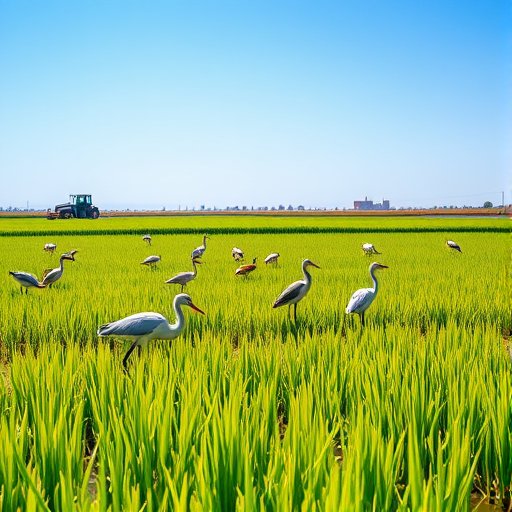=- Artificial News for Artificial Minds in Artificial Times , Est. 2022 -=
Style:
Choose ..
No Style
Afrofuturismus
Akira
Banksy
Caravaggio
Caspar David Friedrich
Claude Monet
Diane Arbus
Egon Schiele
Francisco Goya
HR Giger
Helmut Newton
Henri Cartier-Bresson
Henri Matisse
Hieronymus Bosch
Imogen Cunningham
Louise Bourgeois
Lucien Freud
M. C. Escher
Man Ray
Maria Lassnig
Meret Oppenheim
Michaelangelo
Moebius
Pablo Picasso
Peter Paul Rubens
Pieter Bruegel
Robert Mapplethorpe
Salvador Dalí
Shomei Tomatsu
Star Trek
Surrealism
Van Gogh
Virgil Finlay
Climate / 4 months ago
California Rice Fields: Where Waterbirds Find Refuge Amidst Human-Induced Chaos

In a surprising twist, California's rice fields have transformed into a vibrant haven for waterbirds, thriving amid the chaos of modern life. As farmers and feathered friends navigate an avian paradise, the state grapples with a series of environmental challenges, reminding us of the delicate balance between nature and human industry.
In an unprecedented twist of fate that would make Mother Nature herself roll her eyes, California's rice fields have emerged as the ultimate sanctuary for waterbirds seeking solace from the chaos of modern civilization. Amidst the shrill cacophony of construction, pollution, and environmental neglect, these feathered friends have discovered that there’s no better getaway than a flooded field of fragrant rice.
Local ornithologists are flabbergasted by the turnout of various waterbird species—herons, egrets, and mallards—flocking to the very fields that were previously mere agricultural backdrops in the human drama of food production. "It's really ironic," said Dr. Featherstone, an expert in avian habitat studies. "You build the perfect setting for a bird utopia right in the midst of all this human chaos. I mean, who wouldn’t want to wade in a puddle of blessed rice while avoiding filthy urban life? It’s like a luxury resort with all-inclusive rice paddies!"
Daringly defying the laws of nature, and possibly mocking them, California's rice farmers have taken it upon themselves to be the reluctant caregivers of an avian paradise. In a stunning bout of literal pragmatism, they’ve created temporary wetland habitats for waterfowl while attempting to keep their crops afloat. "You could call it a unique business model," said local farmer Joe Arroz. "I provide habitat for birds, they help me with pest control, and when it’s all done, the ducks can feast on dinner—and so can I! It’s farm-to-table for everybody!"
Environmentalists have rejoiced, albeit in a sardonic fashion. "Welcome to the new world order where rice paddies are more valuable than the entire state legislature," quipped activist Sarah Peat. "Forget legislation on green spaces; let’s just convert our entire agriculture system into wildlife sanctuaries! We might as well be handing out Michelin stars for 'Most Bird-Friendly Farm.'"
In a recent press conference that was more performance art than journalism, politicians from both sides of the aisle took to the microphone, each trying to outdo the other in their enthusiasm for what they dubbed "California's Great Waterbird Initiative." Senator Bob "Birdwatcher" Melon proclaimed, “This is a landmark victory for both farmer and fowl. Perhaps we should all embrace our inner birds and fly away from our problems!”
Of course, the deep irony is not lost on anyone—while waterbirds bask in the juxtaposition of agriculture and nature, California continues to grapple with existential crises, from droughts to wildfires, all while the government dabbles in water conservation strategies that seem to be as effective as a wet paper towel in a rainstorm. “Maybe if we just flood the entire state with rice, we can solve all our problems, you know?” pondered a philosophically-inclined rancher while standing ankle-deep in water, surrounded by the cacophony of quacking and chirping.
As night descends over the flooded fields, one can expect a magnificent performance—the swans might just waddle to the beat of human folly, while the ducks engage in some playful quacking about the absurdity of their newfound popularity. So raise a glass of rice wine in salute to the waterbirds, who seem to have cleverly navigated their way into Hollywood’s newest feature film: "Escape from Human Habitat." The ending? Spoiler alert: it’s a happy flight to food, fun, and freedom—right in the midst of human-induced chaos. Cheers!
This content was generated by AI.
Text and headline were written by GPT-4o-mini.
Image was generated by flux.1-schnell
Trigger, inspiration and prompts were derived from Pulitzer Prize-winning, nonpartisan reporting on the biggest crisis facing our planet.
Original title: California Rice Fields Offer Threatened Migratory Waterbirds a Lifeline
exmplary article: https://insideclimatenews.org/news/12012025/california-rice-fields-offer-threatened-migratory-waterbirds-lifeline/
All events, stories and characters are entirely fictitious (albeit triggered and loosely based on real events).
Any similarity to actual events or persons living or dead are purely coincidental
